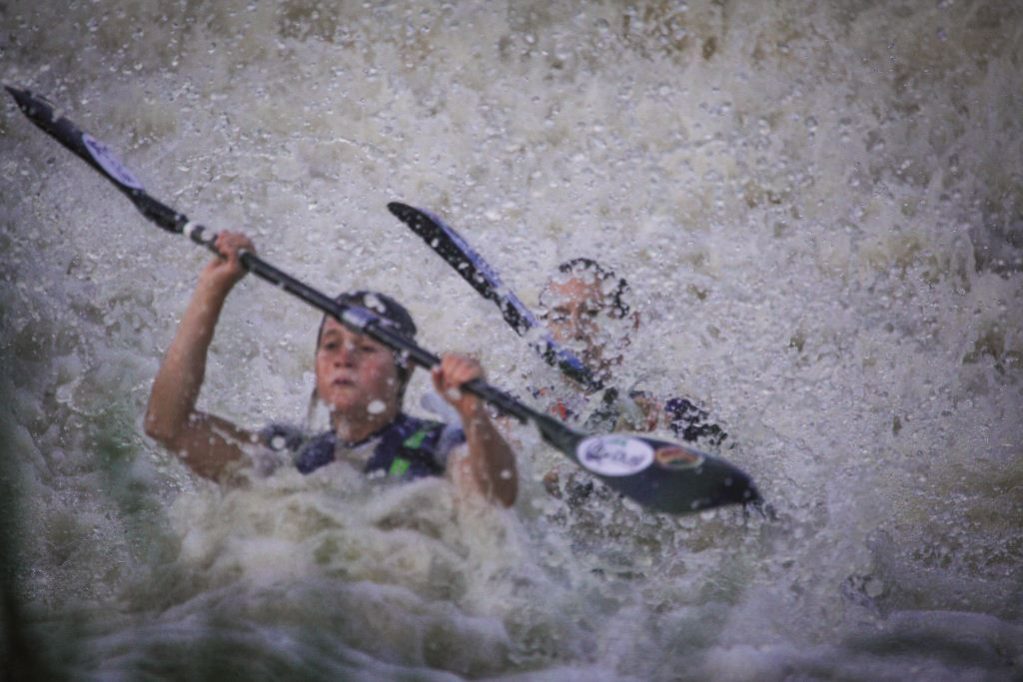It is dawn on a Thursday, the sun is barely over the horizon. A mist swirls between the 25 canoes packed on the banks of the Msunduzi River at the Natal Canoe Club in Pietermaritzburg. Jane Swarbreck and former Olympian Jen Theron are already sweating. They are paddlers in Group C, among the top women in African river racing.
The Dusi Canoe Marathon is a journey across 119 kilometers of wild and treacherous waters in the searing heat of KwaZulu-Natal, tackled only by the toughest competitors. This race draws tens of thousands, only a thousand qualify, and fewer make it to the finish line. Even fewer are women.
This is how Africa’s toughest river race has run since 1951. It was conceived by South African soldier Ian Player around a campfire in Italy, during World War II. Six years after the war, Player was the only one to finish it. It took him six days, eight hours and 15 minutes. He survived two days of low rivers, a flash flood and a night adder bite.
For Swarbreck and Theron, who finished fifth in the women’s category, the challenges on the white waters would make Player tremble in his soaked boots.

Loading...
“There is a massive difference between navigating with an 18kg and a 22kg canoe. It is slower in a heavier one, but your lines in the water with a lighter canoe have to be clean. If not, you will sink and that can cost you four to five minutes a time. When you are racing, every minute counts,” says Theron.
It is a race won on the road as much as the river. The weight makes a huge difference when portaging – that is getting out of the water and carrying the canoe rather than risking it split in half on the rocks.
“The Dusi is unlike any race in South Africa. If you cannot run you do not stand a chance of winning… sometimes I just wish a man could race in a woman’s body to see how difficult it is,” she says.
Theron knows a thing or two about the limits of the female body. She competed in the 500 meter K2 and K1 sprints at the 2008 Beijing Olympics, finishing 8th and 7th respectively. For years, she trained alongside men and says there is a big difference in physicality between genders.
“Men have a faster recovery time because of their testosterone. It does not mean women train less than men, they train equally, it is just they are physically unable to,” says Theron.
Along with carrying heavy canoes, barring the first day when they set out in a women-only group, women racers face off canoe-to-canoe with men.
“On the water you have guys constantly tailing you in your wake, like the peloton in the Tour de France, it can take off 30% of their resistance in the water and you cannot get them off your back,” says Swarbreck.
An electrical engineer by day, Swarbreck is a South African adventure racer, who has at times ‘dabbled’ on the water. A year ago you would not have caught her near the Dusi race. She learned to paddle in a few months and was surprised when Theron approached her to team up.
“Even getting around the dam once and not falling in the water was an accomplishment for me. Now, I came fifth in the Dusi. Who knows what can happen next year,” says Swarbreck.
Despite having equal footing on the water, women that win prize money have a different story to tell.
“I think it is really unfair that the race organizers can give male winners R115,000 ($10,500) and the females half of that. It is the only race in South Africa where the top prizes are unequal,” says Theron.
The organizing committee cited that the prize pool was smaller due to a lack of depth of field in the women’s category. In the 2013 Fish River Canoe Marathon, also held in South Africa, the prize money sat at R30,000 ($2,750) for both genders.

“What is more upsetting was the female winners were 23rd overall. A couple of years ago, coming in 64th would have meant you came first. You can see how women have improved and their race was much more exciting than the men’s,” says Theron.
Abbey Ulansky, known as the Dusi Queen, clinched her ninth pole position when she crossed the line with partner Robyn Kime, called the Dusi Princess, making it their third victory in a row as a pair. They won with a slim lead of two minutes and eight seconds.
Along with Theron and Swarbreck was an unlikely pair made up of a Czech, Ana Adamova, who trained in the sub-zero temperatures of a European winter, and South African Abby Adie. From day one, they were nipping at the leaders’ heels.
It was an eventful final day for Adamova and Adie. The two started 90 seconds behind the leaders. What they did not see coming were children pelting them with stones 20 kilometers from the end. Adamova finished the race with blood pouring down her face.
Of the 817 canoes that took to the misty waters of the Msunduzi River in Pietermaritzburg, 715 made it to Durban three days later. It is a tough race for anyone, for these women it is just another day on the water.
Loading...








